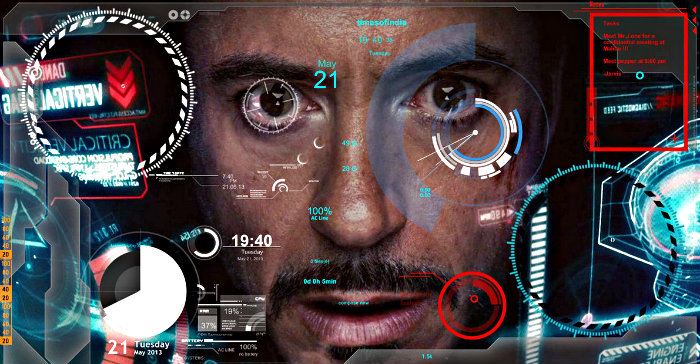Iron Man, Not Terminator: The Pentagon’s Sci-Fi Inspirations
Posted on

Tony Stark (Robert Downey Jr.) relies on the JARVIS artificial intelligence to help pilot his Iron Man suit. (Marvel Comics/Paramount Pictures)
WASHINGTON: “When most people when they hear me talk about this, they immediately start to think of think of Skynet and Terminator,” said the deputy secretary of defense. “I think more in terms of Iron Man.” The Pentagon wants artificial intelligence, said Bob Work, but it doesn’t want “killer robots that roam the battlefield” without human control.
Instead, Work said told an Atlantic Council conference, citing half-a-dozen science fiction stories from Iron Man to Stark Trek to Ender’s Game, the goal is something like the JARVIS software that runs Tony Stark’s fictional super-suit: “a machine to assist a human where the human is still in control in all matters, in all matters, but the machine makes the human much more powerful and much more capable.”

Robert Work
A Marine Corps artilleryman turned national security intellectual, Bob Work is lead architect of the Defense Department’s high-tech “offset strategy,” which seeks to offset the always superior numbers and growing technological sophistication of Russia, China, and other adversaries by developing new tools and tactics. While electromagnetic railguns, lasers, hypersonic weapons, and more are all being funded and developed, artificial intelligence has increasingly become the unifying idea of the offset.
“The Third Offset is really kind of simple at its core,” Work said. (The first offset was nuclear weapons, the second smart weapons). “It basically hypothesizes that the advances in artificial intelligence and autonomy [are] going to lead to a new era of human-machine collaboration and combat teaming.”
Smart weapons of a sort have been around since 1943, when the Germans launched the first acoustic homing torpedo and first radio-guided missile. But there’s no precedent for artificial intelligence, which means many of the people who’ve thought hardest about it aren’t strategists or scientists, but science fiction writers.
“People have been thinking about this for quite some time and you can learn very interesting things [from] A lot of the stuff that you read in science fiction,” Work said.
So what is Work’s favorite food for thought? Besides Iron Man and Terminator, he praised the Atlantic Council’s “Art of Future Warfare” project (to which I contributed a fictional Russian invasion of Estonia) and promised to read the next anthology of offset strategy-themed stories. But he also identified an array of sci-fi classics, from multi-media franchises like Iron Man to relatively obscure texts like the Bolo stories, “one of my favorite book series.”
Air Force officer and diplomat turned author Keith Laumer‘s best-known stories concern the Bolos, gigantic robot tanks with planet-shaking weapons. The twist is that Laumer’s artificially intelligent war machines are loyal, moral, and honorable — often more so than their human masters, which drives much of the conflict in the series. Work singled out the loyal way Bolos work with and for human officers as a model for real-world artificial intelligence to aspire to.
Work also extolled Orson Scott Card’s Ender’s Game — “I didn’t think was all that good of a movie but it was a heck of a book” — for its depiction of a commander directing far-flung forces via computer networks. The story also shows the psychological toll that even such abstract, remote warfare takes on those who lead it.
Worse yet, in Ender’s Game the commanders are pre-pubescent children picked for their adaptability and agility of mind. As the pace of technological change accelerates, Work wondered aloud, will we need to take Ender as our model and have “younger and younger and younger commanders?”
In addition, Work cited David Weber’s space-battles stories — a kind of sci-fi version of Admiral Nelson and Horatio Hornblower, where the commander’s personality is crucial to victory. He also invoked John Ringo’s Posleen stories where future soldiers, like Iron Man, wear powered armor that not only protects but boosts their strength, speed, and senses. (This trope originated with Robert Heinlein’s novel Starship Troopers, which bears almost no resemblance to the film of the same name).
Then there was Star Trek, the mothership that made science fiction (relativel) mainstream in American culture. Work cited William Shatner’s famously cantankerous captain for his willingness to get creative and break the rules when necessary, as when Kirk hacked the Star Fleet Academy simulator to win the unwinnable Kobayashi Maru scenario.
“I don’t believe that the commander who listens to the machine all the time is going to be the best commander,” Work said. Sometimes, he continued to laughter, “it’s going to be like James T. Kirk on the Kobayashi Maru where he says, okay, I understand the rules of the game, but I’m going to change the rules.”
What future military training — and reading science fiction — needs to teach young officers, Work said, is “never ever believe that the computer is always going to be write. Trust your judgment — and then we have to train them to operate [in that environment] and to cheat if necessary.”
Subscribe to our newsletter
Promotions, new products and sales. Directly to your inbox.
